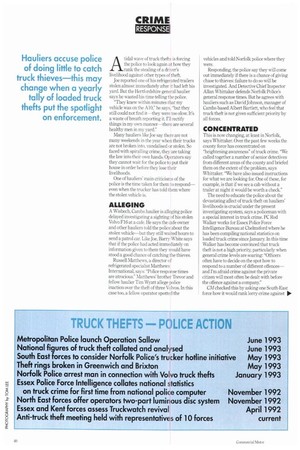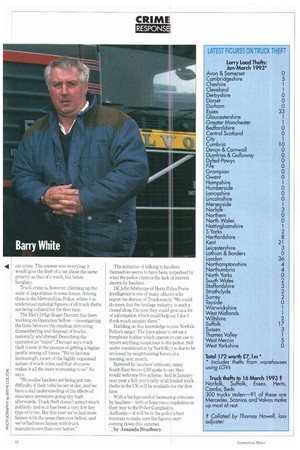A tidal wave of truck thefts is forcing the police to
Page 42

Page 44

If you've noticed an error in this article please click here to report it so we can fix it.
look again at how they rank the stealing of a driver's livelihood against other types of theft.
Joe reported one of his refrigerated trailers stolen almost immediately after it had left his yard. But the Hertfordshire general haulier says he wasted his time telling the police.
"They knew within minutes that my vehicle was on the A10," he says, "but they still could not find it—they were too slow. It's a waste of breath reporting it. I'll rectify things in my own manner—there are several healthy men in my yard."
Many hauliers like Joe say there are not many weekends in the year when their trucks are not broken into, vandalised or stolen. So faced with spiralling crime, they are taking the law into their own hands. Operators say they cannot wait for the police to put their house in order before they lose their livelihoods.
One of hauliers' main criticisms of the police is the time taken for them to respond— even when the trucker has told them where the stolen vehicle is.
ALLEGING
A Wisbech, Cambs haulier is alleging police delayed investigating a sighting of his stolen Volvo F16 at a cafe. He says the cafe owner and other hauliers told the police about the stolen vehicle—but they still waited hours to send a patrol car. Like Joe, Barry White says that if the police had acted immediately on information given to them they would have stood a good chance of catching the thieves.
Russell Matthews, a director of refrigerated specialist Matthews International, says: "Police response times are atrocious." Matthews' brother Trevor and fellow haulier Tim Wyatt allege police inaction over the theft of three Volvos. In this case too, a fellow operator spotted the vehicles and told Norfolk police where they were.
Responding, the police say they will come out immediately if there is a chance of giving chase to thieves: failure to do so will be investigated. And Detective Chief Inspector Allan Whittaker defends Norfolk Police's general response times. But he agrees with hauliers such as David Johnson, manager of Cambs-based Albert Bartlett, who feel that truck theft is not given sufficient priority by ill forces.
CONCENTRATED
This is now changing, at least in Norfolk, says Whittaker. Over the past few weeks the county force has concentrated on "heightening awareness" of truck crime. "We called together a number of senior detectives from different areas of the county and briefed them on the extent of the problem, says Whittaker. "We have also issued instructions for what we are looking for. One of these, for example, is that if we see a cab without a trailer at night it would be worth a check."
The need to educate the police about the devastating affect of truck theft on hauliers' livelihoods is crucial under the present investigating system, says a policeman with a special interest in truck crime. PC Rod Walker works for Essex Police Force Intelligence Bureau at Chelmsford where he has been compiling national statistics on loaded truck crime since January. In this time Walker has become convinced that truck theft is not a high priority-, particularly when general crime levels are soaring: "Officers often have to decide on the spot how to respond to a number of different offences— and I'm afraid crime against the private citizen will most often be dealt with before the offence against a company."
CM checked this by asking one South-East force how it would rank lorry crime against O.
car crime, The answer was worrying: it would give the theft of a car about the same priority as that of a truck, hut below burglary.
Truck crime is, however, climbing up the scale of importance in some forces, Among these is the Metropolitan Police, where it is understood national figures of all truck thefts are being collated for the first time.
The Met's Mgt Roger Durrant has been working on Operation Sallow—investigating the links between the stealing, delivering, dismembering and disposal of trucks nationally and abroad. Describing the operation as "major". Durrant says truck theft is now in the process of getting a higher profile among all forces. "We've become increasingly aware of the highly organised nature of truck crime and that of course makes it all the more interesting to us", he says, "We realise hauliers are being put into difficulty if their vehicles are stolen, and we have a real understanding of the effects of insurance premiums going sky high afterwards. Truck theft doesn't attract much publicity and so it has been a very low key type of crime. But this year we've had more liaison with the press than ever before, and we've had more liaison with truck manufacturers than ever before."
The initiative of talking to hauliers themselves seems to have been torpedoed by what the police claim is the lack of interest shown by hauliers.
DC John Sibthorpe of Herts Police Force Intelligence is one of many officers who regret the demise of Truckwatch: "We could do more, but the haulage industry is such a closed shop. I'm sure they could give us a lot of information which could help us; I don't think much escapes them."
Building on this knowledge is now Norfolk Police's target. The force plans to set up a freephone hotline which operators can use to report anything suspicious to the police. Still under consideration by Norfolk, it is due to be reviewed by neighbouring forces at a meeting next month.
Battered by hauliers' criticism, many South-East forces CM spoke to say they would welcome this scheme. And in January next year a full year's tally of all loaded truck thefts in the t:K. will be available for the first time.
With a background of increasing criticism by hauliers—with at least two complaints on their way to the Police Complaints Authority—it will be in the police's best interests to make sure the figures start coming down this summer.
by Amanda Bradbury




















































































